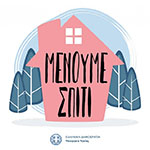Σημαντική επισήμανση για τις χρεώσεις μέσω κινητής τηλεφωνίας
Υπενθυμίζουμε ότι η μηδενική χρέωση μέσω κινητής τηλεφωνίας ισχύει για τις ιστοσελίδες που αναφέρονται στο
(δελτίο τύπου του ΥΠΑΙΘ), όπου περιλαμβάνονται τα Διαδραστικά Σχολικά Βιβλία ( e-books.edu.gr ), η κεντρική πύλη αναζήτησης ΦΩΤΟΔΕΝΤΡΟ ( photodentro.edu.gr ) και όλα τα Αποθετήρια Εκπαιδευτικών Πόρων Φωτόδεντρο ( photodentro.edu.gr/lor , photodentro.edu.gr/video , photodentro.edu.gr/edusoft , photodentro.edu.gr/ugc , photodentro.edu.gr/oep , photodentro.edu.gr/i-create ).
Η προβολή περιεχομένου που φιλοξενείται σε εξωτερικά αποθετήρια ή ιστοσελίδες εκτός των παραπάνω ή το άνοιγμα συνδέσμων που οδηγούν σε εξωτερικό περιεχόμενο δεν υπάγονται στη μηδενική χρέωση.

ΓΛΩΣΣΑΡΙΟ
Όρος |
Ορισμός |
|---|---|
| admiral (noun) | an officer of very high rank in the navy, ναύαρχος
|
| amphitheatre (noun) | an oval or round building with seats rising in rows from an open, central area. Amphitheatres are used for sports and other public events, αμφιθέατρο
|
| barbarian (noun) | someone from a different tribe or land, who people believe to be wild and not civilized, βάρβαρος
|
| beard (noun) | the hair growing on a man's face, μούσι
|
| bronze (noun) | a brown metal made of copper and tin, χαλκός
|
| bull (noun) | male cow, ταύρος
|
| century (noun) | a period of 100 years, αιώνας
|
| chronological (adjective) | arranged according to when things happened or were made, χρονολογικός
|
| civilisation (noun) | the culture of a particular society that has reached an advanced level, πολιτισμός
|
| continent (noun) | one of the earth's seven major areas of land. The continents are Africa, Antarctica, Asia, Australia, Europe, North America, and South America, ήπειρος
|
| cover (verb) | to take into account; Include, περιλαμβάνω
|
| crop (noun) | plants grown on a farm, σοδειά
|
| desert (noun) | a large area of land where it is always very hot and dry, and there is a lot of sand, έρημος
|
| dictator (noun) | a ruler who has complete power over a country, especially one whose power has been gained by force, δικτάτορας
|
| divide (verb) | to separate into parts, χωρίζω
|
| emperor (noun) | the male ruler of an empire,αυτοκράτορας
|
| empire (noun) | a group of countries ruled by a single person, government or country, αυτοκρατορία
|
| farmer (noun) | someone who owns or takes care of a farm, αγρότης
|
| gallery (noun) | a building used to display or sell art, γκαλερί
|
| general (noun) | a very high-ranking officer, especially in the army, στρατηγός
|
| gladiator (noun) | a man in ancient Rome who fought other men or animals, often to the death, to entertain an audience, μονομάχος
|
| goddess (noun) | a female god, θεά
|
| guide (noun) | a person who shows the way or leads others, οδηγός, ξεναγός
|
| guided tour (noun) | if someone takes you on a guided tour, they show you around a place of interest and tell you all about it, ξενάγηση
|
| helmet (noun) | a strong hard hat that covers and protects the head, κράνος
|
| huge (adjective) | extremely large in size or amount, τεράστιος
|
| hunt (verb) | to set out to find and kill for food or sport, κυνηγώ
|
| important (adjective) | necessary or of great value, σημαντικός
|
| keep out (verb phrase) | to not go in a place, or to stop someone or something from going into a place, μένω μακριά από
|
| main (adjective) | most important, κύριος
|
| monster (noun) | a large, frightening imaginary creature, μυθικό τέρας
|
| mummify (verb) | to transform a dead body into a mummy, μουμιοποιώ
|
| mummy (noun) | a dead body that has been preserved with special chemicals and wrapped in cloth. The ancient Egyptians are famous for their mummies, μούμια
|
| museum (noun) | a building where objects of historical, scientific or artistic interest are kept, μουσείο
|
| neck (noun) | the part of the body of both human beings and animals that connects the head with the body, λαιμός
|
| nowadays (adverb) | at the present time, in comparison to the past, στη σημερινή εποχή
|
| official (noun) | a person who performs a specific function or holds an office in a business organization or a government, επίσημος, ανώτερος υπάλληλος
|
| order (noun) | the way that things or events are arranged in relation to each other, for example showing whether something is first, second, third etc [= sequence], σειρά
|
| pharaoh (noun) | a king of ancient Egypt, Φαραώ
|
| philosopher (noun) | one who studies the nature of life, truth, knowledge, and other important human matters, φιλόσοφος
|
| popular (adjective) | liked by many people, δημοφιλής
|
| power (noun) | ability to control people and events, δύναμη, ισχύς
|
| protect (verb) | to keep someone or something safe from injury, damage or loss, προστατεύω
|
| raise (verb) | to take care of a person, or an animal or plant, until they are completely grown, ανατρέφω, μεγαλώνω
|
| remind (verb) | to make someone think of something they have forgotten or might have forgotten, θυμίζω
|
| rule (noun) | a government or control, εξουσία
|
| rule (verb) | to have authority over; govern, εξουσιάζω
|
| statue (noun) | a piece of art made from a hard material, especially stone or metal, to look like a person or animal, άγαλμα
|
| strict (adjective) | expecting people to obey rules or to do what you say, αυστηρός
|
| temple (noun) | a building or place where gods and goddesses are worshiped, ναός
|
| ticket (noun) | a small, narrow slip of paper or thin cardboard that shows that one has paid for something, εισιτήριο
|
| trade (noun) | the act of exchanging or buying and selling goods, εμπόριο
|
| train (verb) | to practise a sport often in order to prepare for a sporting event, προπονούμαι
|
| warrior (noun) | a person who fights or has experience in battle; Soldier, πολεμιστής
|















